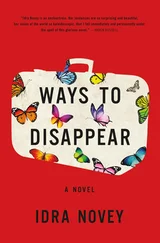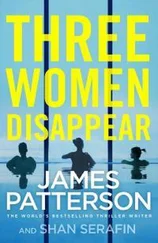While she ushers the others into the living room, I act as if I’m going to use the bathroom. She won’t mind me walking around a little and seeing what her house is like before taking my seat with the group.
Quietly, I walk to the bathroom, which is large and fitted out for a wheelchair user, with lifting equipment like in a hospital. I know that a home caregiver comes twice a day to help Ian with hygiene. Then I poke my head into the kitchen, which looks more ordinary. The walls are mustard-colored, ’80s-style, and the kitchen cabinets cheap, but Andrea has hung up lots of kids’ drawings and paper chains and photos. There’s so much color and life here that it makes you just want to sit down and hang out with your family.
The biggest picture is of Ian seated in his wheelchair and grinning, while their youngest crawls on his lap and their eldest stands at his side, thoughtfully leaning her head against the backrest.
I’d like to poke my head into the bedroom too, but Andrea has stacked two moving boxes in front of the door. They’d be easy to get past, but they may signal that she wants to keep the bedroom to herself.
In the small entryway, I stand quietly and listen through the door to the living room. Lissie’s telling them how she tried explaining to her husband this afternoon where Andrea lives. “ ‘It’s just north of Hillerød.’ ‘Ohh, in the direction of Køge?’ ‘No, up along King’s Road past Birkerød.’ ‘Do you go past Kolding?’ ”
I can hear them laughing in there, Lissie loudest of all. Kolding’s on the mainland, some three hours in a completely different direction. “ ‘You drive up along King’s Road, and then north of Hillerød you take a right.’ ‘Ah, now I understand! You head toward the airport!’ ‘No, no, toward a small town called King’s Meadows.’ ‘And then past Roskilde?’ ‘No, no, no!’ ‘Well then I’m completely confused. Do you drive toward Gilleleje?’ ‘Yes, at the start you could actually say it’s toward Gilleleje.’ ‘Okay, and then you turn off at Odense?’ ”
They keep laughing on the other side of the door. Lissie has the healthiest spouse of the group. She and her husband still see their friends, travel together, and I dare say enjoy life on his pension, but he suffers from spatial disorder and can perseverate as well. When he has a bad day, he can ask questions about directions for half an hour at a stretch without realizing that time is passing, and in the end he gets to be tremendously annoying.
Lissie told us once that she laughs a lot with her husband. But by now I’ve heard plenty of women say the exact same thing, only to find out later that they actually laugh at their husbands, who laugh along without really understanding why. It might sound harsh to say that the best thing you’ve got left from a long marriage is laughing at how stupid your husband is, but if that’s the only way to keep your spirits up …
I open the door to where the others are sitting, just as Andrea says that Bernard’s been delayed a bit. I stop in the doorway. “Delayed? But I thought he wasn’t coming today. That’s what Merethe said.”
“Yes, he was supposed to have a meeting at Lærke’s day-care center, but it was rescheduled.”
Do they notice anything in my reaction? They must be deaf and blind if they don’t.
But nobody reacts, and I sit down quickly without a word, staring at the table. Bernard must think I’m not coming tonight, because I sent Andrea my regrets and only found out today that a meeting at school had been canceled.
I should leave now. I should definitely leave. Bernard’s been in the group much longer than me.
The others talk about the relationships they have with their in-laws — ancient mothers and fathers who are helping take care of sons over sixty.
The doorbell rings. Andrea gets up and the others chatter on, oblivious.
Faint noises in the hall. Is he hanging up his jacket? Andrea’s friendly chuckle. The door opens.
He catches sight of me and slumps, and hunched over he retreats backward to the hallway.
“Bernard, Bernard! What’s the matter?” the women all call in chorus.
“Nothing!” he answers from the far side of the door.
“Yes, but …”
They look anxiously at one another.
And then he enters again, erect and smiling. It took only a few seconds.
“I get stomach cramps once in a while,” he says, avoiding my gaze. “It’s the stress. Don’t worry about it.”
They fall on him. “That’s awful! You should do something about it.” “Werner had the same thing, but he got over it.” “Have you had X-rays?” “I know a good specialist.” “Carrot juice, have you tried that?”
“Sorry to frighten you. It’s nothing, I feel better already.”
At home in bed, I’ve tried to explain to myself that he can’t really look as handsome as I remember. But he does. Silver-grey, lean, smiling broadly. And already he’s able to look at me, cheerful and energetic, as if there’s nothing between us. The others can’t possibly notice anything. I’m not sure how sincere his charm seems to me, though it convinces the others; these last few months I’ve gotten to know his facial expressions better. Tonight he inhabits the expressions in turn and then, as if he wants to withdraw into some solitary reverie, abandons them. But the others don’t see it.
We discuss differences in municipalities and how much rehab they’ll subsidize for people with brain injuries and physical handicaps. Gerda’s animated. The hair on Bernard’s hands isn’t as grey as on his head, and I wonder, Is all his body hair dark? I can see the vaulted musculature beneath his shirt. I think of rowers, tennis players, and hundred-meter sprinters — their shoulders, their arms, their chests. That’s how they look; and they’re not old.
Ulla talks about her doubts. “The more years we spend supporting our husbands and wives,” she says, “and the more we learn about how to do it really well, the longer the road back to what we wanted to do with our lives. Aren’t we really just helping each other veer farther off course, down some dead end?”
The fine creases in the corners of his eyes form patterns in constant motion. Kirsten tells us more about her husband’s admission to the hospital and cries. The corners of Bernard’s eyes are trees, a forest, the two of us, the hands, the slender fingers. Now Ulla’s crying too, and he drapes an arm around her. The creases become bushes in the mist, a light on the far side of a cliff.
And then the meeting’s over.
We all crowd into Andrea’s small entryway. We hug each other and look Ulla and Kirsten in the eye, and a couple of minutes later I’m sitting in my car in the dark, not turning the key in the ignition. Kirsten drives past, Anton drives past, Ulla drives past.
Bernard’s car is parked farther up a ways. It doesn’t start up either, and I can faintly make his silhouette out through the window.
I think of how Lærke was kind to me. She trusts me; and the marriage they have is a lovely one. I don’t owe Frederik anything, because I’ve already given him more than anyone could expect. But Lærke — I have to look out for Lærke. I will give Bernard energy, so he can stay with that poor sick woman even longer. I must promise myself to stop if I ever start detracting from her life instead of contributing to it.
I get out of my car and walk toward his. He remains seated. The streetlamps are intensely orange — more so than the lights in Farum or Copenhagen — and they make the outlines of the handicapped vehicles light up against the black hedges and the smooth bright pavement.
Bernard gets out of his car. I don’t say anything. He doesn’t say anything. The orange light. I raise my mouth and kiss him. He collapses a bit — like when he saw me in Andrea’s living room — and his hands gather up my hips. Now we’re alone, with the cherry blossoms in the dark tree-tops above us and scattered upon the asphalt beneath our feet.
Читать дальше



![Ally Carter - [Gallagher Girls 01] I'd Tell You I Love You But Then I'd Have to Kill You](/books/262179/ally-carter-gallagher-girls-01-i-d-tell-you-i-lo-thumb.webp)








